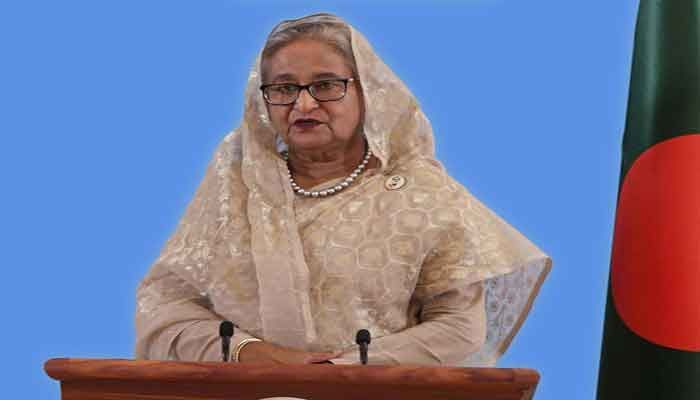
Desk Report
Publish: 02 Oct 2020, 10:56 am

On Thursday, Prime Minister Sheikh Hasina pledged to increase women's workforce participation to 50-50 by 2041 and called for the security of their work in the light of the COVID-19 pandemic.
The Prime Minister also urged the international community to renew its commitments and to reinforce efforts to ensure the equality, empowerment and development of women, reports BSS.
"In the context of COVID-19, the job of female workers, including migrant workers, across the global supply chains and other major employment sectors, must be protected so that they are not further marginalized and financially excluded," she said while highlighting three issues virtually at a high-level meeting in the United Nations headquarters in New York.
On the sidelines of the 75th UN General Assembly (UNGA), the High Level Meeting on the 25th Anniversary of the Fourth World Conference on Women was held.
While pointing out two other problems, the premier first said that every girl whose potential is realized will benefit the world, every woman whose talent is tapped, and this can only be accomplished through education.
"Secondly, empowerment comes with income and employment. Therefore, engaging women in income-generating activities should be a priority," she said.
The prime minister said she is delighted to join the celebration of the 25th anniversary of the 4th World Conference on Women. "On this 25th anniversary, I would like to pledge to raise women's participation in the workforce leading to 50-50 by 2041," she said.
Sheikh Hasina said the Covid-19 pandemic has particularly aggravated the vulnerability of women.
"During this pandemic, women are facing discrimination and increased domestic violence, and, therefore, threatening to reverse our hard-earned achievements in women empowerment," she said.
She said the 1995 Beijing Declaration and Platform for Action charted a bold roadmap to achieve gender equality and women's empowerment.
"It has profoundly changed our outlook towards women and catalyzed positive development," she said.
Since then, Sheikh Hasina said, virtually all countries have formulated legislative mechanisms to encourage and protect women and girls. The 2030 Plan also acknowledged the centrality of women in all priorities and objectives.
"As we enter the Decade of Action, we must renew our commitments and enhance our efforts to ensure women's equality, empowerment and advancement," she said.
The prime minister thanked the UN Secretary General for prioritizing women's representation at senior levels of the UN, saying: "We would like to see that at all levels."
Sheikh Hasina said immediately after independence, Father of the Nation Bangabandhu Sheikh Mujibur Rahman placed women at the heart of the country's development agenda, referring to Bangladesh 's enormous development in women's empowerment.
The prime minister said under Bangabandhu's legendary statesmanship, the country crafted a progressive constitution guaranteeing equal rights for men and women.
"Our development intervention, which is based on a whole-of-society approach, focuses more on the practical need of our women," she said.
Sheikh Hasina continued: "That's why we have made girls' education a priority, economic and political empowerment of women a necessity. We see women as active agents of development, not as passive recipients."
The premier said the government has formulated a progressive Women Development Policy in 2011.
"The reserved seats for women in the national parliament have been risen to fifty," she said, mentioning that at present, the Leader of the House, the Deputy Leader of the House, the Opposition Leader and the Speaker of parliament are women.
Thirty percent of seats in local government bodies are allocated to women, Sheikh Hasina said, while special provisions have been made to improve women's representation in the public service.
She said women are now becoming judges of the highest court, VCs of public universities , government ministry secretaries, and so on. Female financial inclusion has been ensured by gender budgeting, micro-finance and related initiatives.
The premier said the government's investment in women is paying dividends with women thriving in every sector of the society.
"Today, 20 million women are engaged in agriculture, industry, and service sectors, while over 3.5 million women are working in the readymade garments sector, our largest export-earning sector," she said.
Sheikh Hasina said nearly 1,500 women military and police officials have so far served in UN peacekeeping operations. "Our women are breaking barriers and succeeding in careers that our previous generation could never imagine," she said.
The premier said Bangladesh earned many global accolades due to its achievements in women empowerment.
"According to the World Economic Forum's Gender Gap Index, we are leading in South Asia on women's overall empowerment, ranked 50th globally out of 149 countries, and 7th in political empowerment … we have much more to do," she said.
Subscribe Shampratik Deshkal Youtube Channel
© 2024 Shampratik Deshkal All Rights Reserved. Design & Developed By Root Soft Bangladesh